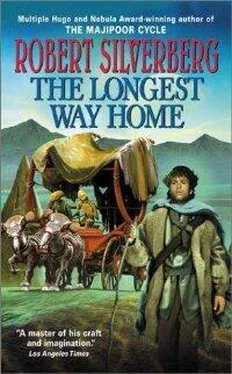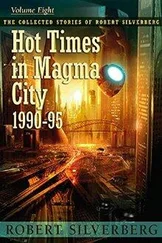“It was in the night,” Joseph said. “They came into the Great House and killed all the Masters there.” He searched about in his memory for the names old Waerna had mentioned, the dead Masters, the leader of the rebels, but he could not remember them. If Stappin queried him about that, he would have to invent the names and hope for the best. But Stappin did not ask for names.
“They killed everyone, the men and the women both, and even the children, and they burned their bodies, and they burned the house also. The place is a complete ruin. There is nothing left there but charred timbers, and all of the Masters of Ludbrek House are dead.”
“Did you help to kill them?”
“I? No, not I!” It was easy enough to sound genuinely shocked. “I must tell you, Governor Stappin, I was of the Folk of Ludbrek House. I could never have struck a blow against the Masters of the House.”
“A stendling, yes,” Stappin said. His tone did not seem so much one of contempt as of simple acknowledgment; but, taken either way, it left Joseph with no doubt of the word’s meaning.
“It would not be in my nature to turn against my Masters that way,” Joseph said. “If that is a mark against me, I am sorry for that. But it is the way I am.”
“I say nothing about that.” And then, with an odd little flicker of his eyes: “What work did you do, when you were at Ludbrek House?”
Joseph was unprepared for that. But he did not hesitate to answer. I must not lose my way, he told himself. “I was in the stables, sir,” he said, improvising dauntlessly. “I helped care for the bandars and the ganuilles.”
“And where were you while they were killing the masters and burning the house?”
“I was hiding, sir. Under the porch that faces the garden. I was afraid they would kill me too. I have heard that many Folk who were loyal to their Houses were killed by the rebels, everywhere in High Manza, and elsewhere too, perhaps.”
“When the killing was over, what did you do then?”
“There was no one in sight when I came out. I fled into the forest and lived on my own for a few days. Then I met a noctambulo in the woods who took me to a nearby village of Indigenes. I had hurt my leg and was unable to walk, and the Indigenes took me in and helped me.”
There still was obvious skepticism in the governor’s expression. These stories must seem like children’s fairy-tales to him, Joseph thought. Since everything Joseph was telling him now was the absolute truth, though, he began to feel that he had passed a critical stage in the interrogation. So long as he had been making things up, or borrowing pieces of the other Waerna’s account of the uprising, there was always the risk that Stappin would catch him out in a lie. But from this point on he would not be making things up. Sooner or later Stappin would have to accept his narrative as the truth.
He said, “When I recovered, I went into the service of the Indigenes. That may sound strange, yes. But I have some skills at healing the sick, from my work with the stables. When they discovered that, the Indigene villagers used me as a doctor for their own people for a time.” Joseph went on to explain how they had sold him, finally, to others of their kind, and how he had been passed from village to village in the high country while the winter rainy season came and went. Here, too, the governor would not be able find any chink of falsity in his tale, for it was all true. “At last,” he said, “I grew tired of living among the Indigenes. I wanted to be back among my own people. So I escaped from the village where I was, and came down out of the mountains. But I did not know that the land down here was as empty as it proved to be. There were no Great Houses, no villages of the Folk, not even any Indigenes. I used up the food I had brought with me and after a time I could find nothing anywhere to eat. There were many days when I ate nothing but insects, and then not even those. I made myself ready for death. Then I was found by two men of Eysar Haven, and the rest you know.”
He sat back, wearied by the long speech, and tried to ready himself for what Stappin was likely to ask him next, which he supposed would be a question about what he planned to do now. It would hardly be prudent to say that he was heading south, for what reason would he have for wanting to go in that direction? The best thing to reply, he guessed, was that he had no plan at all, that with his House destroyed he was without affiliation, without purpose, without direction. He could say that he had not taken the time to form any plan yet, since he would be in no shape to go anywhere for weeks. Later, when he was healthy again, he could slip away from Eysar Haven and continue on his way to Helikis, but that was nothing he needed to tell Governor Stappin.
The question that he had been expecting, though, did not come. Stappin confronted him again in inscrutable silence for a time, and then said, with a tone of finality in his voice, as though he had reached some sort of verdict within himself, “Once again your luck has held, young Waerna. There will be a home for you here. Saban and Simthot are willing to give you shelter in their house as a member of their own family. You will work for them, once you have your strength again, and in that way you will pay them back the cost of your lodging.”
“That seems quite fair, sir. I hope not to be a burden on them.”
“We do not turn starving strangers away in Eysar Haven,” said Stappin, and began to move toward the door. Joseph, thinking that the interview was at its end, felt a sudden great relief. But the governor was not done with him yet. Pausing at the threshold, Stappin said suddenly, “Who was your grandfather, boy?”
Joseph moistened his lips. “Why, Waerna was his name also, sir.”
“Is a Folkish name, Waerna. I mean your real grandfather, the one whose blood runs in your veins.”
“Sir?” said Joseph, baffled and a little frightened.
“Don’t play with me. There’s Master blood in you, is it not so? You think I can’t see? Look at you! That nose. Those eyes. Small wonder you stayed loyal to your House when the uprising came, eh? Blood calls out to blood. As much Master blood in you as there is Folk, I’d venture. Stendlings!” There was no doubting the contempt in his voice this time.
And then he was gone, and Joseph sank back against his pillow, numb, empty.
But he was safe. Despite their suspicions, they had taken him in. And in the days that followed, his strength began quickly to return. They fed him well; Joseph felt guilty about that, knowing that he would never stay here long enough to repay Saban and Simthot for what they were providing for him, but perhaps he could do something about that when, if, he reached his homeland again. Meanwhile his only consideration must be to make himself ready for a continuation of his journey. As Joseph grew accustomed to regular meals again, he ate more and more voraciously each day. Sometimes he ate too much, and went off by himself to hide the nausea and glut that his greed had caused in him. But his weight was returning. He no longer looked like a walking skeleton. Thayle trimmed his hair, which was shaggy and matted and hung down to his shoulders, now, cutting it back to the much shorter length favored by the people of Eysar Haven. Then Velk brought him a mirror and a scissors, so that Joseph could trim his beard, which had become a bedraggled disorderly black cloud completely enveloping his face and throat. He had not seen his own reflection in months, and he was horrified by what the mirror showed him, those knifeblade cheekbones, those crazily burning eyes. He scarcely recognized himself. He looked five years older than he remembered, and much transformed.
No one said anything to him, yet, about working. Once he was strong enough to go out on his own, he spent his days exploring the town, usually by himself, sometimes accompanied by Thayle. He found it very pleasant to be with her. Her strapping Folkish physique, the breadth of her shoulders and her wide staunch hips, no longer troubled him: he saw that he was adjusting his ideals of feminine beauty to fit the circumstances of his present life. He did indeed find her attractive, very much so. Now and again, as he lay waiting for sleep, he let his mind wander into thoughts of what it would be like to press his lips against Thayle’s, to cup her breasts in his hands, to slide himself between her parted thighs. The intensity of these fantasies was something utterly new to him.
Читать дальше












